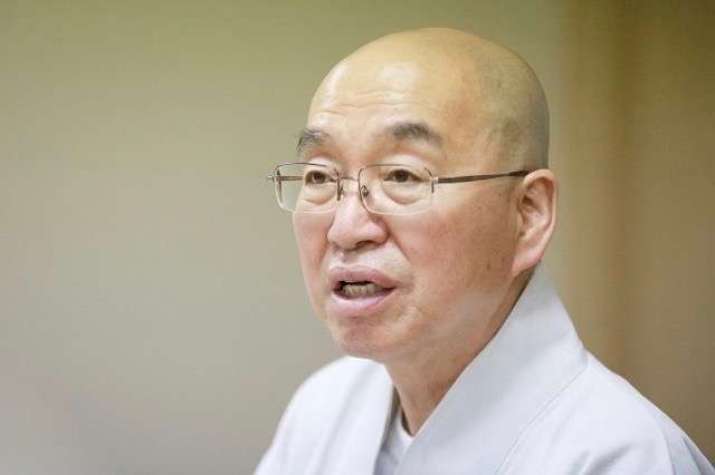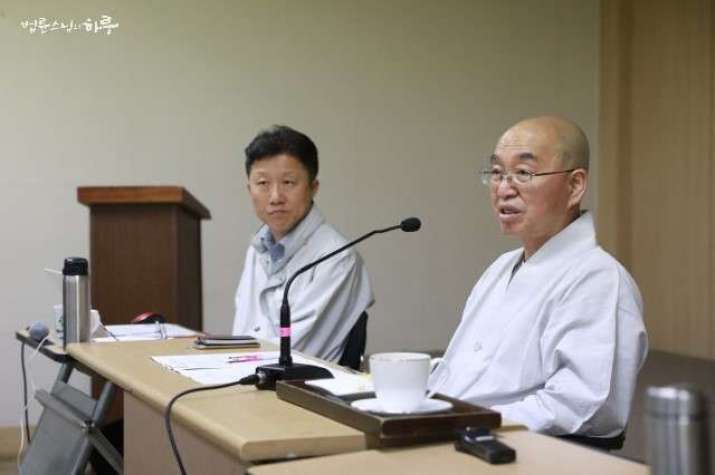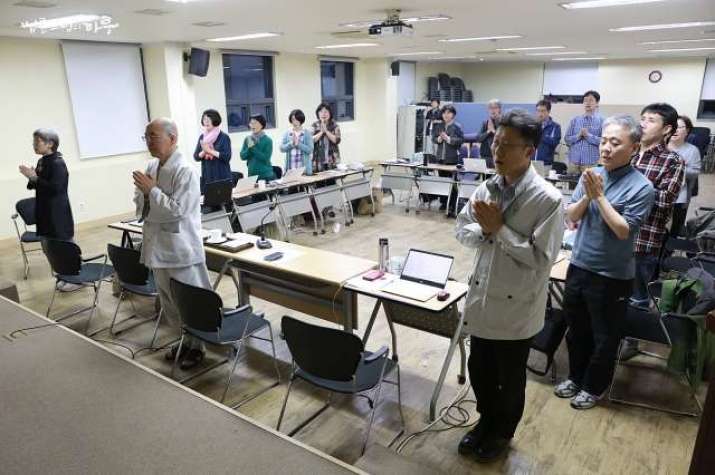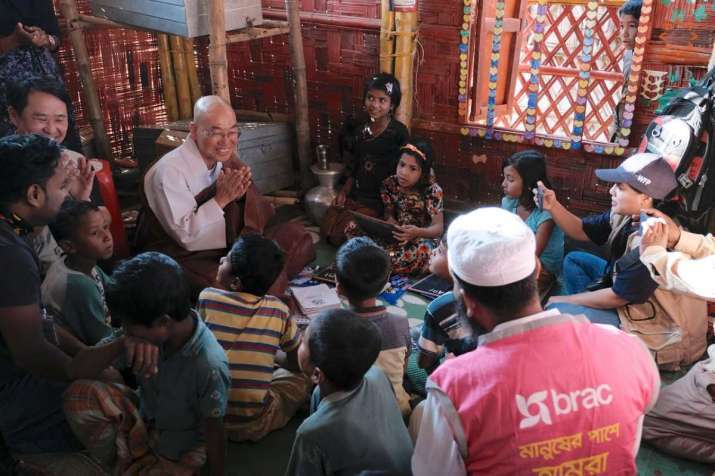FEATURES|COLUMNS|Chasing Light
Engaged Buddhism: Seon Master Pomnyun Sunim Pledges 10,000 Tons of Food Aid for Children in North Korea
 Join Together Society founder Seon master Venerable Pomnyun Sunim. Image courtesy of JTS
Join Together Society founder Seon master Venerable Pomnyun Sunim. Image courtesy of JTSDue the sensitive and evolving political situation in North Korea, circumstances at the time of publication necessitated the removal of some details and images from this article to protect the identities of those involved and to ensure that the valuable work of JTS is not jeopardized.
With North Korea’s state media reporting that the country is facing its worst drought in decades, driven by the lowest levels of rainfall in a century, food shortages and hunger in the isolated nation are becoming growing crises. Korean Seon (Zen) master Venerable Pomnyun Sunim* (법륜스님), founder and chairman of the Join Together Society (JTS), an international Buddhist humanitarian relief organization, recently led an aid delegation to North Korea, where he reviewed the situation firsthand, resolving to provide 10,000 tons of corn for hungry communities, in particular vulnerable children.
“I visited [several areas in North Korea], where people were busy getting ready for the farming season,” Pomnyun Sunim related following his return to South Korea. “Although I had limited access to certain areas, North Korean society gave an overall impression of being clean and neat. Also, maybe because of their efforts to do everything independently without relying on a foreign power, I felt a sense of vibrancy in North Korea. However, I witnessed that there were many areas that seemed to be struggling due to the lack of food supplies.”
According to the Rodong Sinmun, the official newspaper of the Central Committee of the Workers’ Party of Korea, North Korea recorded precipitation levels of just 56.3 millimeters in the year to 17 May—the lowest since 1917—and water reserves in the country’s lakes and reservoirs are running extremely low. “The ongoing drought is causing a significant effect on the cultivation of wheat, barley, corn, potatoes, and beans,” the North Korean newspaper reported. (Al Jazeera)
 Pomnyun Sunim shares the findings from his visit to North Korea with the Jungto Society Planning Committee. Image courtesy of JTS
Pomnyun Sunim shares the findings from his visit to North Korea with the Jungto Society Planning Committee. Image courtesy of JTSSunim, who has actively engaged with North Korea for many years, campaigning for peace and supporting North Korean refugees through the provision of clothing, food, and medicine, observed that members of the more privileged segments of North Korean society had access to government food supplies, and even many ordinary citizens were managing make a sustainable living. North Koreans living outside the direct care of the government, however, have been facing the hardest struggle, he said, adding that gauging exactly how much hardship they are experiencing was extremely difficult.
“The people who are suffering the most severe food shortages are said to be those working for mining companies,” Sunim explained. “The big mining companies, with tens of thousands of laborers, are the ones experiencing the most difficulty.” He noted that rock, coal, iron, and other mining projects have been directly impacted by international economic sanctions and were thus unable to export their output.
“As a result, their revenue has been cut by more than half compared with what they used to make exporting coal to other countries, so they cannot afford to buy enough food to feed their workers,” he said. “The laborers are complaining that they cannot work because they don’t have enough to eat. Hearing such stories made me realize the severity of the food shortage situation.”
Based on the findings of Pomnyun Sunim’s visit and his suggested course of response, JTS’s Planning Committee resolved to conduct a fundraising campaign to provide corn to North Korea starting from Vesak, the day marking the birth of the historical Buddha, known in Korea as Seokga tansinil (석가탄신일), which this year was celebrated in South Korea on 12 May. This special fundraising campaign will run until 30 June.
 Jungto Society Planning Committee meeting. Image courtesy of JTS
Jungto Society Planning Committee meeting. Image courtesy of JTSJTS received permission from South Korea’s Ministry of Unification to provide 10,000 tons of corn to North Korea as humanitarian aid. JTS has so far sent 2,360 tons of corn, which will be used to nourish children most at risk from the food shortage in the form of corn rice, corn porridge, and cornbread.
According to a UN World Food Programme (WPF) report, 136 million tons of food are needed to address North Korea’s current food shortage. WFP spokesman Herve Verhoosel told a press conference in Geneva earlier this month that “10.1 million people [in North Korea] suffer from severe food insecurity, meaning they do not have enough food till the next harvest.” (DW)
When Sunim explained to his contacts in North Korea that JTS focuses on helping children, he was advised that the mining towns are populated not only by mine workers but entire families, include children and the elderly, 40 per cent of whom are under 18, thus by offering aid to mining communities, JTS would be feeding children.
“Since both the laborers and their families are eligible for food aid, helping the mining towns can be considered as helping children,” Sunim emphasized.
North Korea suffered a devastating famine in the mid-1990s. Despite a lack of reliable data for the humanitarian disaster, estimates for the number of people who died during the famine range between 250,000 and 3 million people, with impoverished rural regions in the communist country most at risk.
 Pomnyun Sunim meets children at a Rohingya refugee camp in Cox’s Bazar, Bangladesh. Image courtesy of JTS
Pomnyun Sunim meets children at a Rohingya refugee camp in Cox’s Bazar, Bangladesh. Image courtesy of JTSFounded as an expression of the compassion of engaged Buddhism and the belief that helping others is the best way to enrich one’s own life, JTS was established by Ven. Pomnyun Sunim in 1993.** Headquartered in Seoul, JTS operates program offices in South Korea, Germany, and the US, along with field offices in India and the Philippines. The organizations has Special Consultative Status to the United Nations Economic and Social Council (ECOSOC).
In October 2017, JTS Korea provided 15 tonnes of rice and 700 mosquito nets to Rohingya camps in Bangladesh, and in January 2018 brought a further 30 tonnes of rice and 2,000 blankets. During these visits the World Food Programme (WFP), the UN organization overseeing relief camps, requested JTS Korea to also provide gas stoves to help relieve a fuel shortage. Early this year, JTS delivered a consignment of 100,000 gas stoves to a refugee camp in Bangladesh that is housing hundreds of thousands of Rohingya Muslims fleeing persecution and violence in neighboring Myanmar.
Charged with bringing hope, empowerment, and self-reliance to underprivileged communities in developing countries, JTS is run and manned by unpaid volunteers, which ensures that all donations go toward benefitting the marginalized communities with which the organization works. JTS carries out relief work in countries suffering from disasters, with the aim of “solving the problems of poverty and pain in Asia by the efforts of Asian people,” and has already completed humanitarian projects in Cambodia, Laos, Myanmar, North Korea, the Philippines, and Sri Lanka.
* Sunim is a Korean title of respect for Buddhist monastics.
** Engaging with Suffering, Realizing Freedom: An Interview with Ven. Pomnyun Sunim (Buddhistdoor Global)
See more
JTS International
JTS Korea
JTS America
Jungto Society
정토회
Pomnyun
North Korea food rations hit record low level after poor harvest: UN (DW)
North Korea raises alarm over worst drought in a century (Al Jazeera)
Related features from Buddhistdoor Global
My Journey on the Path of Won Buddhism
Jungmyungsa Buddhist Temple: A Haven of Korean Buddhism in Queens
Seon and the City
Related news reports from Buddhistdoor Global
Korean Buddhist Humanitarian Organization JTS Brings 100,000 Gas Stoves to Rohingya Refugees in Bangladesh
Engaged Buddhism in Action: KMJ Offers Disaster Relief in the Wake of Deadly Lombok Quakes
Korean Buddhist Humanitarian Organization JTS Offers Relief for Typhoon Mangkhut Victims in the Philippines














